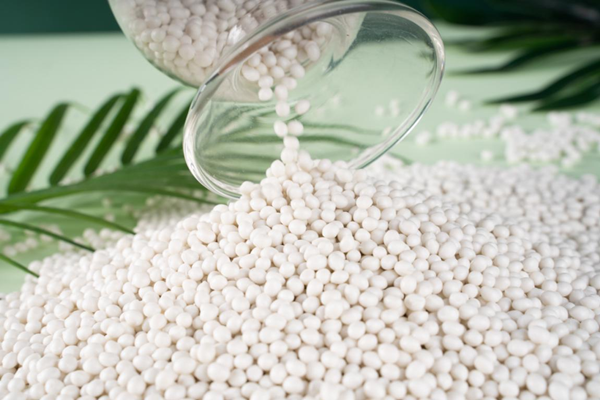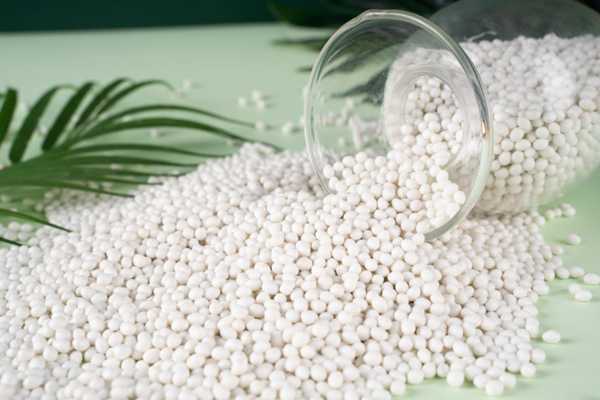
Biodegradable plastics, also known as biodegradable plastics, refer to plastics that are degraded by microorganisms existing in nature under natural conditions such as soil and/or sandy soil, and/or specific conditions such as composting, Anaerobic digestion or aqueous culture medium, and finally completely degraded into carbon dioxide (CO ₂) or/and methane (CH ₄), water (H ₂ O) and the mineralized inorganic salts of its elements, as well as new biomass. In other words, biodegradable plastics do not increase environmental load and are an effective way to solve white pollution.
Calcium carbonate is a Inorganic compound, chemical formula is CaCO3, commonly known as limestone, limestone, stone powder, etc. Calcium carbonate is alkaline and insoluble in water, but soluble in hydrochloric acid. It is one of the common materials on the earth, and exists in aragonite, Calcite, chalk, limestone, marble, Tufa and other rocks. It is also the main component of some animal bones or shells. Calcium carbonate is also an important building material with a wide range of industrial applications.
Calcium carbonate filled with biodegradable plastics can accelerate the degradation of biodegradable plastics. At the same time, calcium carbonate can be directly used as a carbon source by some inorganic trophic microorganisms. The organic acid produced by microorganisms when they move in the soil, and the nitric acid and sulfuric acid produced by Nitrifying bacteria and sulfide bacteria can further improve the solubility of calcium carbonate.
1. Promote degradation: calcium carbonate particles increase the distance between resin molecules, reduce the force of polymer chain segments, hinder the re crosslinking of macromolecular free radicals, promote the free radical Chain reaction reaction initiated by photodegradation, and accelerate the degradation of biodegradable plastics.
2. Easy to decompose: Buried in humid environments, calcium carbonate can undergo chemical dissolution, and it is directly utilized as a carbon source by some inorganic trophic microorganisms.
3. Reduce viscosity and improve flowability: The surface treated calcium carbonate enhances the viscosity of degradable plastics, improves material flowability, and reduces energy consumption.

CaCo3 based biodegradable & compostable resin is one of the most abundant biopolymers. It is completely biodegradable, inexpensive, renewable and can be easily chemically modified.
1. Our study found that when using ultrafine calcium carbonate to modify PBAT, the tensile properties of PBAT/ultrafine calcium carbonate blend were significantly improved when the mass fraction of ultrafine calcium carbonate was 10% and the mass fraction of compatibilizer was 3 parts. When the mass fraction of ultrafine calcium carbonate reaches 20%, the membrane bag still has good mechanical properties. Its main components are PBAT+PLA+COCO3+Others. Its color is whiter than starch based biodegradable and compostable resin and will not change color at high temperatures. It cannot meet home composting standards, but it can be used for industrial composting.
Composting can be divided into home composting and industrial composting.
Industrial composting: under controlled conditions, microorganisms degrade solid and semi-solid organic substances in aerobic medium temperature or high temperature to produce stable Humus. The general cycle is 180 days, but with changes in aerobic composting technology, the shortest time can also be up to 30 days or even shorter.
Home composting: mainly utilizing household kitchen waste or garden waste for aerobic composting, used for the production of composting processes for personal use. Domestic composting takes longer than industrial composting, but generally does not exceed one year.
2. Weifang Huawei New Materials Technology Co., Ltd will apply the functional calcium powder modified by a certain type of composite modifier to PBAT blowing film processing. The COCO3 based biodegradable and compostable resin addition amount reaches about 30-40%, and the produced biodegradable plastic shopping bags have a tensile strength of over 18MPa and an elongation at break of over 470%, fully meeting the requirements of supermarket film bags. The products have excellent cost-effectiveness.
3. Activated calcium carbonate has a high reinforcement effect in PBAT modification due to its extremely small particle size and high activity. When using activated calcium carbonate for PBAT blending modification, a certain amount of compatibilizer needs to be added to improve the physical and mechanical properties of the product. After modification with calcium carbonate, the material can be rapidly and completely biodegradable, significantly reducing product costs, and has better practical operability for manufacturing membrane bag products.
